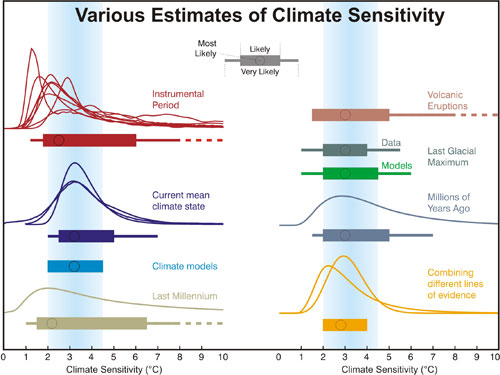Monckton Myth #4: Climate Sensitivity
 Climate sensitivity is a measure of the change in global temperature if atmospheric CO2 was doubled. If there were no climate feedbacks, warming from doubled CO2 would be around 1°C. There are many lines of evidence that indicate climate sensitivity is around 3°C. In other words, feedbacks amplify the initial warming from rising CO2. However, Christopher Monckton disputes this. In Monckton's response to Steketee's article, he claims:
Climate sensitivity is a measure of the change in global temperature if atmospheric CO2 was doubled. If there were no climate feedbacks, warming from doubled CO2 would be around 1°C. There are many lines of evidence that indicate climate sensitivity is around 3°C. In other words, feedbacks amplify the initial warming from rising CO2. However, Christopher Monckton disputes this. In Monckton's response to Steketee's article, he claims:
"Most climate scientists have not studied the question of how much warming a given increase in CO2 concentration will cause: therefore, whatever opinion they may have is not much more valuable than that of a layman. Most of the few dozen scientists worldwide whom Prof. Richard Lindzen of MIT estimates have actually studied climate sensitivity to the point of publication in a learned journal have reached their results not by measurement and observation but by mere modeling. The models predict warming in the range mentioned by Mr. Steketee, but at numerous crucial points the models are known to reflect the climate inaccurately."
Monckton's conceit (here and in numerous other presentations) is that estimates of high climate sensitivity come from models, while an estimate of low climate sensitivity, courtesy of Richard Lindzen, comes from measurements and observations. This is a false portrayal of the state of the science. There are many determinations of climate sensitivity based on measurements and observations. In fact, several studies use more complete satellite observations than those used by Lindzen and find high climate sensitivity.
To calculate climate sensitivity, Lindzen looks at sea surface temperature in the tropics along with satellite measurements of outgoing radiation (Lindzen et al 2009). The change in outward radiation tells us how climate responds to changing temperature. Their analysis found that when it gets warmer, more outgoing radiation escapes to space which has a cooling effect. Lindzen concluded that negative feedbacks actually suppress surface warming and our planet has a low climate sensitivity of about 0.5°C.
However, a number of peer-reviewed papers have exposed fatal flaws in Lindzen's methods. His result of low climate sensitivity is heavily dependent on the choice of end points in the periods he analyses - slight changing of these end points gives widely varying results including positive feedback (Trenberth et al 2010).
In addition, what Lindzen is trying to do is calculate global climate sensitivity from tropical data. The tropics are not a closed system - a great deal of energy is exchanged between the tropics and subtropics. To properly calculate global climate sensitivity, global observations are required. Several studies have performed the same analysis using near-global data. One study found that small changes in the heat transport between the tropics and subtropics can swamp the tropical signal. They conclude that climate sensitivity must be calculated from global data (Murphy 2010).
Another study reproduced Lindzen's analysis and compared it to results using near-global data (Chung et al 2010). The near-global data find high climate sensitivity and the authors conclude that the tropical ocean is not an adequate region for determining global climate sensitivity. So Monckton's characterisation that measurements find low climate sensitivity does not give you the full picture. In actuality, Lindzen's data covers only part of the globe and more complete observations find high climate sensitivity.
There is another important reason why we can be confident that negative feedbacks aren't our get-out-of-jail-free card to rescue us from global warming. Measurements of past climate change have not found negative feedback suppressing climate change. On the contrary, what we find in the Earth's past is dramatic climate change - positive feedbacks amplifying changes in temperature. A multitude of papers looking at different periods in Earth's history independently and empirically converge on a consistent answer - climate sensitivity is around 3°C implying net positive feedback.

Figure 1: Various estimates of climate sensitivity (Knutti and Hegerl 2008).
Monckton's depiction that high climate sensitivity is based on models rather than observation is false. A number of lines of evidence all paint a consistent picture - positive feedbacks will amplify the warming caused by greenhouse gas emissions.Posted by John Cook on Wednesday, 19 January, 2011
 Climate sensitivity is a measure of the change in global temperature if atmospheric CO2 was doubled. If there were no climate feedbacks, warming from doubled CO2 would be around 1°C. There are many lines of evidence that indicate climate sensitivity is around 3°C. In other words, feedbacks amplify the initial warming from rising CO2. However, Christopher Monckton disputes this. In Monckton's response to Steketee's article, he claims:
Climate sensitivity is a measure of the change in global temperature if atmospheric CO2 was doubled. If there were no climate feedbacks, warming from doubled CO2 would be around 1°C. There are many lines of evidence that indicate climate sensitivity is around 3°C. In other words, feedbacks amplify the initial warming from rising CO2. However, Christopher Monckton disputes this. In Monckton's response to Steketee's article, he claims:

